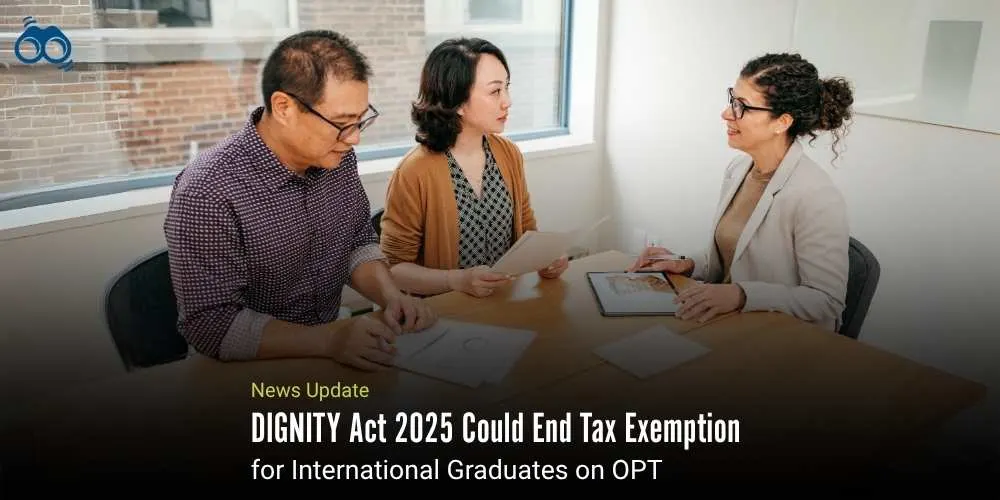New US Bill Could Add Thousands in Taxes for International Students on OPT
DIGNITY Act Targets OPT Payroll Exemption, Threatening Affordability for Foreign Students
A new immigration bill in the United States, the DIGNITY Act of 2025, may significantly alter how international students are taxed while working under the Optional Practical Training (OPT) programme. Formally titled “Dignity for Immigrants while Guarding our Nation to Ignite and Deliver the American Dream” (DIGNIDAD), the Act is a sweeping, bipartisan immigration reform proposal currently under review in the US House of Representatives. Among its key provisions is a proposal to eliminate the FICA tax exemption that currently benefits foreign graduates working under OPT. At present, these students and their employers are not required to pay Social Security and Medicare taxes, collectively known as FICA. If the bill becomes law, both students and employers would be liable for a combined 15.3% payroll tax, placing them on par with American workers.
Currently, wages earned by OPT participants are treated as nonresident income, which exempts them from the 6.2% Social Security and 1.45% Medicare tax deductions. This exemption provides substantial savings for both parties. However, should the DIGNITY Act pass, international students would no longer enjoy this financial relief. Such a change could result in additional tax burdens running into hundreds or even thousands of dollars annually, on top of already steep tuition fees and rising living costs. For many international students, this could dramatically shift the cost-benefit equation of studying in the US.
Understandably, the proposed tax changes have triggered alarm among universities, student groups, and immigrant advocacy organisations. Many argue that this move could make American higher education less affordable and less appealing, particularly when competing with other global education destinations. The OPT programme, which permits international students to work in their field for up to 12 months or up to 36 months for STEM graduates, has long been a draw for those seeking practical experience after graduation. The FICA exemption has made it especially attractive to both students and employers, particularly small businesses and startups that depend on skilled talent without the added cost of payroll taxes.
Critics of the proposed changes contend that taxing international students contradicts the DIGNITY Act’s own goals, which include protecting American competitiveness and attracting global talent. They fear that the added costs could deter high-achieving students, especially in fields like engineering, IT, and healthcare, where the US has traditionally relied on foreign expertise. Further fuelling the debate, some conservative lawmakers have argued that the OPT programme gives foreign graduates an unfair edge in the labour market. They claim that in sectors like technology, international graduates are being preferred over American candidates due to cost advantages.
Adding to the controversy, Joseph Edlow, the newly appointed Director of US Citizenship and Immigration Services (USCIS), has reportedly criticised OPT. He described the programme as a potential loophole that could be exploited by employers seeking to hire cheaper labour. His remarks reflect a growing push within Republican circles for tighter visa regulations and expanded taxation of international student workers. Analysts caution that the proposed tax changes could also influence employer hiring decisions. Companies that currently benefit from hiring OPT graduates without payroll tax obligations may re-evaluate their staffing strategies. In some cases, startups and smaller firms might scale back OPT hiring or consider offshoring jobs to manage costs.
From an academic perspective, universities are worried that these tax changes could lead to a decline in international student enrolment. Many institutions rely heavily on global talent, particularly in technical disciplines. A drop in numbers could affect not only research productivity but also institutional revenue. According to the US Department of Homeland Security, over 200,000 international students join the OPT programme annually, with most employed in sectors such as healthcare, engineering, and information technology. While the Social Security tax has a 2025 wage cap of $176,100, the Medicare tax applies to all earnings, meaning OPT participants could be taxed on every dollar they earn. Although the DIGNITY Act is still being debated in Congress, its inclusion of the FICA tax proposal marks a significant shift in US immigration and education policy. Increasingly, international students are being seen not just as learners, but as taxable workers, a change that could impact how the US is perceived on the global education stage. Ultimately, if passed, the DIGNITY Act could force many prospective students to reconsider whether the American dream is still worth pursuing.
Editor’s Note:
The proposed removal of the FICA tax exemption under the DIGNITY Act of 2025 marks a pivotal moment in US immigration and education policy. While the Act is framed as a bipartisan effort to modernise visa systems and support legal pathways, its impact on international students, particularly those working under the Optional Practical Training (OPT) programme, could be severe. If enacted, the bill would impose a 15.3% payroll tax on foreign graduates, eliminating a long-standing exemption that has made the OPT route financially viable for thousands of students and their employers. For many, this change would translate into additional costs running into thousands of dollars annually, compounding already high tuition fees and living expenses. The financial strain could deter talented students from choosing the US as a study destination, especially in competitive fields like engineering, IT, and healthcare. Universities, immigrant advocacy groups, and employers have rightly raised concerns. The OPT programme has long served as a bridge between academic training and professional experience, and its affordability has been central to its success. Removing the tax exemption risks undermining the very competitiveness the DIGNITY Act claims to protect. Reduced international enrollment would harm institutional revenue, research, and local economies. Employers might shift jobs offshore or favour domestic candidates over OPT graduates.
Skoobuzz asserts that The DIGNITY Act's tax provisions could undermine its goal of attracting global talent by making the American dream less accessible.














0 Comments (Please Login To Continue)